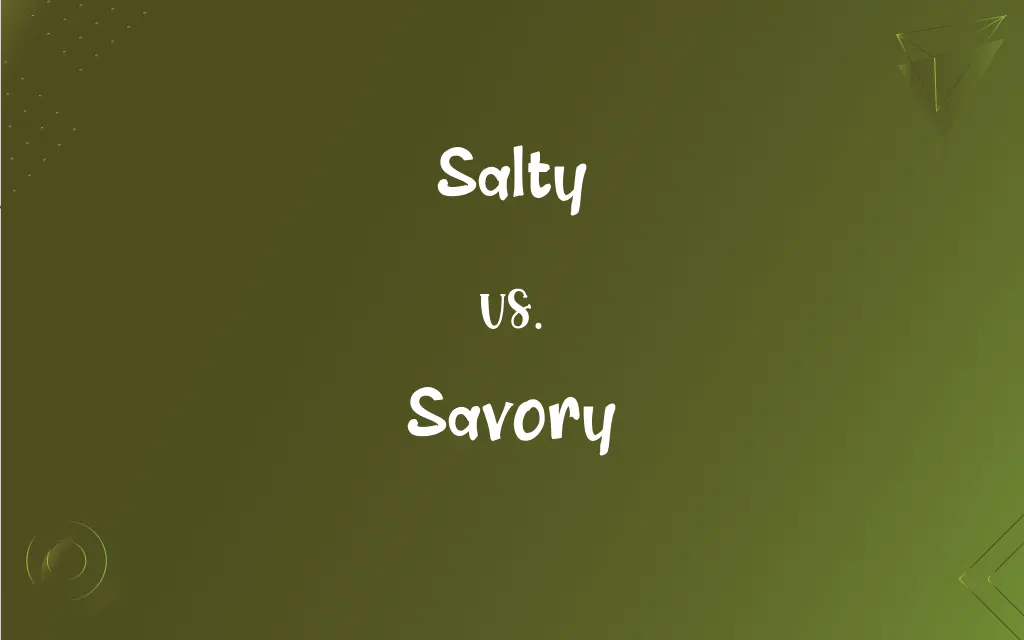Salty vs. Savory: What's the Difference?
Edited by Harlon Moss || By Janet White || Updated on October 10, 2023
"Salty" refers to a taste resembling salt, while "Savory" denotes a flavorful taste that's not sweet.

Key Differences
"Salty" and "Savory" are terms frequently employed in culinary contexts to describe distinct taste profiles. "Salty" is straightforward and pertains to the taste that closely resembles or is attributed to salt. For instance, ocean water is salty because of its high salt content. On the other hand, "Savory" describes a taste that is rich, flavorful, and predominantly not sweet. It's one of the basic tastes and is often equated with "umami," a taste profile common in broths and cooked meats.
Both "Salty" and "Savory" play pivotal roles in enriching the flavor of dishes. Salty flavors, derived mainly from the addition of salt, can enhance other flavors in a dish, making them more pronounced. Conversely, savory flavors, often stemming from proteins, amino acids, or certain vegetables, add depth and complexity, making a dish more satisfying and appetizing.
In the English language, both terms have extended meanings beyond the realm of taste. "Salty" can colloquially describe someone who is irritable or bitter, often due to a specific circumstance. For instance, a person might be "salty" after losing a game. "Savory," however, can be used to describe a morally wholesome situation, as opposed to something that's not "savory."
Culturally, the appreciation for both salty and savory tastes varies. Some cuisines may have a pronounced salty dimension, using salted preserves or condiments. Meanwhile, other culinary traditions may prize the savory umami flavor, employing ingredients like mushrooms, soy sauce, or seaweed to impart that rich taste. Both tastes, while different, complement each other and are foundational in many dishes around the world.
Comparison Chart
Primary Meaning
Taste resembling or attributed to salt.
Flavorful taste that's not sweet.
ADVERTISEMENT
Culinary Role
Enhances other flavors.
Adds depth and complexity to dishes.
Extended Meaning
Can mean irritable or bitter.
Can mean morally wholesome.
Origin of Taste
Mainly from salt.
From proteins, amino acids, or certain vegetables.
Association with Umami
Not directly associated.
Closely related to the umami taste.
Salty and Savory Definitions
Salty
Having a taste of, or containing, salt.
The popcorn was too salty for my liking.
ADVERTISEMENT
Savory
Having a spicy or salty flavor without sweetness.
The savory stew warmed us up in winter.
Salty
Experienced, especially in terms of naval life.
The salty sailor recounted tales of his adventures.
Savory
Morally wholesome or acceptable.
The details of the scandal were not savory.
Salty
Irritable or bitter in demeanor.
He was salty about the team's loss.
Savory
Appetizing to the taste or smell.
The kitchen was filled with a savory aroma.
Salty
Resembling the sea or things related to the sea.
He had a salty air about him after years at sea.
Savory
An aromatic plant used in cooking.
She added some savory to the soup for extra flavor.
Salty
Coarse or risqué in language.
His salty jokes made a few people uncomfortable.
Savory
Having a rich or zesty taste.
The savory sauce complemented the steak perfectly.
Salty
Of, containing, or seasoned with salt.
Savory
Appetizing to the taste or smell
A savory stew.
Salty
Suggestive of the sea or sailing life.
Savory
Piquant, pungent, or salty to the taste; not sweet.
Salty
Witty; pungent; earthy
Salty humor.
Savory
Morally respectable; inoffensive
A past that was scarcely savory.
Salty
Tasting of salt.
Savory
A dish of pungent taste, such as anchovies on toast or pickled fruit, sometimes served in Great Britain as an hors d'oeuvre or instead of a sweet dessert.
Salty
Containing salt.
Savory
An annual Mediterranean aromatic herb (Satureja hortensis) of the mint family, having pale lavender to white flowers. Also called summer savory.
Salty
; provocative; earthy.
Savory
A related Mediterranean aromatic perennial herb (Satureja montana), having white or pink flowers. Also called winter savory.
Salty
(figuratively) Experienced, especially used to indicate a veteran of the naval services; salty dog (from salt of the sea).
Savory
The leaves of either of these plants, used as seasoning.
Salty
(slang) Irritated, annoyed, angry, bitter, bitchy.
Savory
Tasty, attractive to the palate.
The fine restaurant presented an array of savory dishes; each was delicious.
Salty
(linguistics) Pertaining to the Sardinian language and those dialects of Catalan, spoken in the Balearic Islands and along the coast of Catalonia, that use definitive articles descended from the Latin self instead of the Latin that.
Savory
Salty and/or spicy, but not sweet.
The mushrooms, meat, bread, rice, peanuts and potatoes were all good savory foods.
Salty
Somewhat salt; saltish.
Savory
Umami, modern
The savory rabbit soup contrasted well with the sweet cucumber sandwiches with jam.
Salty
Engagingly stimulating or provocative;
A piquant wit
Salty language
Savory
(figuratively) Morally or ethically acceptable.
Readers are to be warned that quotations in this chapter contain some not so savory language.
Salty
Containing salt;
A saline solution
Salty tears
Savory
(American spelling) A savory snack.
Salty
One of the four basic taste sensations; like the taste of sea water
Savory
Any of several Mediterranean herbs, of the genus Satureja, grown as culinary flavourings.
Savory
The leaves of these plants used as a flavouring.
Savory
Pleasing to the organs of taste or smell.
The chewing flocksHad ta'en their supper on the savory herb.
Savory
An aromatic labiate plant (Satureia hortensis), much used in cooking; - also called summer savory.
Savory
Any of several aromatic herbs or subshrubs of the genus Satureja having spikes of flowers attractive to bees
Savory
Dwarf aromatic shrub of Mediterranean regions
Savory
Either of two aromatic herbs of the mint family
Savory
An aromatic or spicy dish served at the end of dinner or as an hors d'oeuvre
Savory
Morally respectable or inoffensive;
A past that was scarcely savory
Savory
Having an agreeably pungent taste
Savory
Pleasing to the sense of taste
FAQs
Can "Savory" be synonymous with "umami"?
Yes, "Savory" is often equated with the umami taste.
Does "Salty" only pertain to food?
No, it can describe someone's demeanor as irritable or bitter.
Do "Salty" and "Savory" refer to the same taste?
No, "Salty" relates to salt while "Savory" is a rich, non-sweet flavor.
Is "Savory" always about food?
Mostly, but it can also describe a morally acceptable situation.
Why might someone be described as "salty"?
It can refer to being irritable, bitter, or experienced.
How is "savory" different from "spicy"?
"Savory" is rich and flavorful; "spicy" denotes heat.
What's a common savory ingredient?
Mushrooms are often used for their savory quality.
Can a dish be both salty and savory?
Yes, many dishes blend both tastes for depth and flavor.
How can I reduce a dish's salty taste?
Add more ingredients, water, or unsalted broth.
Can savory foods contain sweet elements?
Yes, many dishes blend sweet and savory for complexity.
Why is the sea salty?
Due to mineral content and continuous salt deposit from rivers.
Are there savory drinks?
Yes, some cocktails or broths might be described as savory.
Are there unsavory smells?
Yes, "unsavory" can describe unpleasant tastes or smells.
Is "savory" a type of herb?
Yes, it's an aromatic plant used in cooking.
What's the opposite of a "savory" dish?
A sweet dish would be the opposite.
Is sea air described as "salty" or "savory"?
Sea air is often described as "salty."
If a joke is "salty," what does that mean?
It might be coarse, risqué, or slightly off-color.
What foods are considered savory?
Meats, broths, and certain vegetables like mushrooms.
How does salt enhance flavor?
Salt can amplify other flavors and reduce bitterness.
Can desserts be savory?
Typically, desserts are sweet, but there are exceptions.
About Author
Written by
Janet WhiteJanet White has been an esteemed writer and blogger for Difference Wiki. Holding a Master's degree in Science and Medical Journalism from the prestigious Boston University, she has consistently demonstrated her expertise and passion for her field. When she's not immersed in her work, Janet relishes her time exercising, delving into a good book, and cherishing moments with friends and family.
Edited by
Harlon MossHarlon is a seasoned quality moderator and accomplished content writer for Difference Wiki. An alumnus of the prestigious University of California, he earned his degree in Computer Science. Leveraging his academic background, Harlon brings a meticulous and informed perspective to his work, ensuring content accuracy and excellence.
































































